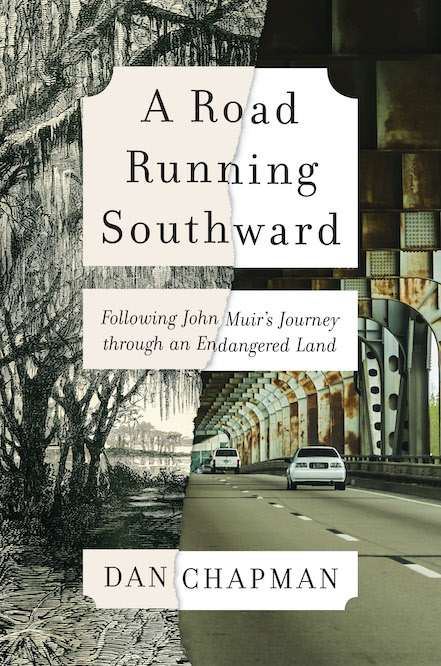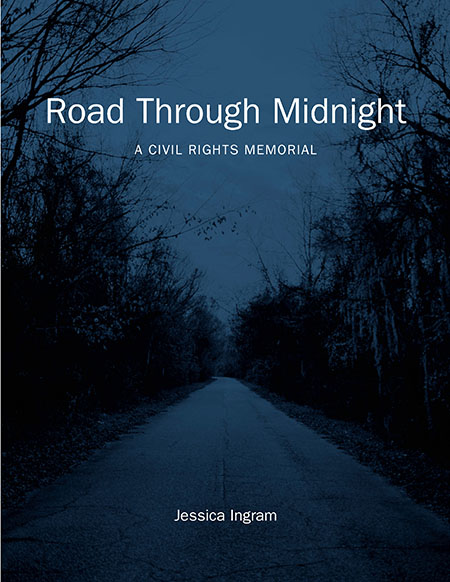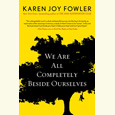Misfits and Magic
Wendy Welch tells the charming, true story of the little bookstore that could
Wendy Welch and her Scottish husband, Jack Beck, with two dogs and two cats in tow, moved to the central Appalachian “Coalfields” region of southwestern Virginia so Welch could take a “low-profile job running educational programs.” The couple had always dreamed of “someday” owning a bookstore, but after a real estate agent showed them a beautiful 1903 Edwardian mansion with hardwood floors and light-filled rooms, Beck asked Welch, “What if someday is today?” Welch’s new memoir, The Little Bookstore of Big Stone Gap, is the story of what happened next.
Suddenly bookstore proprietors, they cast about for a name. Big Stone Gap, Virginia, is the site of the longest running outdoor drama in the U.S.: “The Trail of the Lonesome Pine,” a story based on the 1908 novel by John Fox Jr. They decided to call their bookstore “Tales of the Lonesome Pine Used Books,” figuring it would provide instant name recognition and the appearance of belonging. (Actually being accepted into this small and fiercely protective community, however, took some time.) Armed with little more than their good intentions and no aversion to hard work, the couple wrote a mission statement for their new business, which read in part, “We believe that a used bookstore is neither a new bookstore nor a garage sale; that it is a hard way to make a living; that it is a kind of sacred trust; and that it should be friendly and fun for customers and us.”
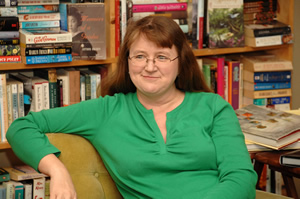 Lacking inventory, Welch and Beck—both avid readers—began by culling 1,500 books from their own shelves. (The store would eventually boast 38,000 volumes.) Welch visited yard sales, learning the hard way which books sell well and which invariably end up given away, and began to craft their ever-evolving credit policy, while Beck built shelves and baked Scottish shortbread for their customers. They struggled to win over people suspicious of outsiders and mostly indifferent toward the first bookstore in the town’s history. Although discouraged when sales failed to materialize—and when Welch lost her “day job”—the couple lived simply and refused to give up. Welch describes her reaction to a somewhat daunting online search for business ideas: “All this data swarmed through my head like the horrid beasties from Pandora’s mythical box. But Hope lived in that box, too. And although the story never mentioned her, I’m certain that Hope’s little sister, Tenacity, also hung around.”
Lacking inventory, Welch and Beck—both avid readers—began by culling 1,500 books from their own shelves. (The store would eventually boast 38,000 volumes.) Welch visited yard sales, learning the hard way which books sell well and which invariably end up given away, and began to craft their ever-evolving credit policy, while Beck built shelves and baked Scottish shortbread for their customers. They struggled to win over people suspicious of outsiders and mostly indifferent toward the first bookstore in the town’s history. Although discouraged when sales failed to materialize—and when Welch lost her “day job”—the couple lived simply and refused to give up. Welch describes her reaction to a somewhat daunting online search for business ideas: “All this data swarmed through my head like the horrid beasties from Pandora’s mythical box. But Hope lived in that box, too. And although the story never mentioned her, I’m certain that Hope’s little sister, Tenacity, also hung around.”
To make friends and entice potential customers into the shop, Welch and Beck drew on their backgrounds in the arts—including years spent performing as singers and storytellers at regional fairs on the weekends—by organizing special events: a St. Patrick’s Day Ceilidh (group dance), Science Day, International Night, Celtic Christmas, and Murder Mystery nights, in which participants solved a “murder” committed inside the bookstore. In addition, they invited like-minded groups to hold meetings at the store. In time, Tales of the Lonesome Pine Used Books began to function as an unofficial community center for writing, needlework, and musical groups, among others. When a reporter for the Kingsport Times-News wrote a generously complimentary article about the store, highlighting the owners’ dedication to creating “a bookstore operated on the principles of imagination and love of life,” customers responded in record numbers.
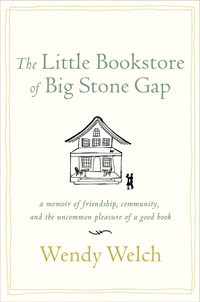 Even lacking some essentials, such as “a degree in family therapy, plus lifetime supplies of hand sanitizer, patience, Goo Gone, pencils, packing tape, and humor—not necessarily in that order,” Welch and Beck eventually learned how to keep the bookstore afloat, but their most surprising lessons come from the community they serve. From the gentle art of accepting books in trade that belonged to a customer’s deceased loved one to listening for the emotional reasons behind requests for specific titles, Welch and Beck realized that “when customers start conversations, be it about their last relationship, their jerk boss, or their aspirations to be an artist, they are like the people in Farenheit 451, living books who must tell you their stories or die. … Perhaps the nicest thing bookstore owners do for the world is not sell people stories, but listen to people’s stories.”
Even lacking some essentials, such as “a degree in family therapy, plus lifetime supplies of hand sanitizer, patience, Goo Gone, pencils, packing tape, and humor—not necessarily in that order,” Welch and Beck eventually learned how to keep the bookstore afloat, but their most surprising lessons come from the community they serve. From the gentle art of accepting books in trade that belonged to a customer’s deceased loved one to listening for the emotional reasons behind requests for specific titles, Welch and Beck realized that “when customers start conversations, be it about their last relationship, their jerk boss, or their aspirations to be an artist, they are like the people in Farenheit 451, living books who must tell you their stories or die. … Perhaps the nicest thing bookstore owners do for the world is not sell people stories, but listen to people’s stories.”
In the tradition of Christopher Morley’s The Haunted Bookshop and Helene Hanff’s 84 Charing Cross Road, Wendy Welch has written a warm and affectionate paean to the love of books and the highs and lows of bookstore ownership. Incorporating quotations by prominent book lovers from Oscar Wilde to Dr. Seuss, the Dalai Lama to Charlotte Bronte, Welch tells her story with easy, self-deprecating grace in chapters with titles such as “How to Be Attacked by Your Heart’s Desire” and “What Happens in the Bookstore Stays in the Bookstore.” Welch is the first to admit that owning a bookstore has been a bumpy ride, but it’s one that neither she nor Beck would trade: “In the midst of having very little time to do as we like,” she writes, “we very much like what we are doing.”
Wendy Welch will discuss The Little Bookstore of Big Stone Gap at Union Ave. Books in Knoxville on October 6 at 2 p.m., at Parnassus Books in Nashville on November 8 at 6:30 p.m., and at The Booksellers at Laurelwood in Memphis on November 9 at 6 p.m.
